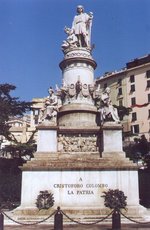Genoa
|
|
- Alternate uses, see Genoa (disambiguation).
It-genoa.gif
Genoa (Italian Genova (jen'o-vah), Genoese Zena (zay'nah), French Gênes) is a city and a seaport in northern Italy, the capital of the Province of Genoa and of the region of Liguria. It has a population of ca. 650,000.
Genua was a city of the ancient Ligurians. Its name is probably Ligurian, meaning "knee" (from Proto-Indo-European *genu 'knee'), i.e. "angle", from its geographical position, thus akin to the name of Geneva. Alternatively, the name has been claimed to derive from Latin Janua ("gate"), the two-headed god Janus, or an ancient word that means "foreigners", as the early settlers were considered foreign by the neighbouring population.
History
Genoa's history goes back to ancient times. A city cemetery, dating from the 6th and 5th centuries B.C., testifies to the occupation of the site by the Greeks, but the fine harbour probably was in use much earlier. Destroyed by the Carthaginians in 209 BC, the town was rebuilt by the Romans, who used it as a base during their wars with Liguria. Under the Romans, the city enjoyed municipal rights and exported skins, wood, and honey.
Faithful to Rome while other Ligurian and Celtic peoples of modern Northern Italy stood by Carthaginians in the Second Punic War, Genoa lost its importance as a Roman port city after the rise of Vada Sabatia, near Savona. Some noteworthy particularities of Genoa are its Etruscan foundations.
During the Middle Ages, Genoa was an independent and powerful republic (one of the so-called Repubbliche Marinare, with Venice, Pisa, and Amalfi) mainly oriented on the sea. Genoa was the most persistent rival of Venice, and like Venice its nominal republic was presided over by a doge (see Doges of Genoa). Genoa fought a series of wars with Venice starting in 1253, the last of which, the War of Chioggia (1378-81), Venice barely survived. The Siege of Chioggia marked the first strategic use of artillery in Italy, and perhaps, Europe.
It-map.png
Crusaders from Genoa brought home a green glass goblet long regarded in Genoa as the Holy Grail itself and thought to be emerald.
The Republic of Genoa extended over modern Liguria and Piedmont. At various times Genoa had several colonies in the Mideast, in the Aegean and the Black Sea, whence the Black Death was imported into Europe from the Genoese trading post at Kaffa (Feodosiya) in the Crimea, in Sicily and Northern Africa. It possessed the islands of Sardinia and disputed Corsica with Corsicans and France until 1768.
Famous Genoese families such as the Dorias (see also Doges of Genoa) had practically complete control of the Tyrrhenian Sea.
The Republic became part of the French Empire until 1815, when the delegates at the Congress of Vienna sanctioned its incorporation into Piedmont (Kingdom of Sardinia). In 1860, Giuseppe Garibaldi set out from Genoa with a thousand volunteers to unify Italy, which was at the time split in several kingdoms. He succeeded.
Famous Genoese include Christopher Columbus (although his birthplace is disputed between Italy and France), Admiral Andrea Doria, violinist Niccolò Paganini and Italian patriot Giuseppe Mazzini.
Miscellaneous
Genoa.jpg
- The port of Genoa is the first in Italy. It ranks second in the Mediterranean after neighbouring Marseille, France.
- The Aquarium of Genoa is the largest in Europe.
- Other landmarks of the city are the Palazzo Ducale (Doge's Palace), St. Lawrence Cathedral (Cattedrale di San Lorenzo), The Old Harbor (Porto Antico), transformed into a mall by architect Renzo Piano, Via Garibaldi with its superb palaces and the monumental cemetery on Staglieno's hill.
- The University of Genoa, with 40,000 students one of the larger universities in Italy, was founded in 1481.
- Genoa 1893 was the first Italian football club.
- The 27th G8 summit took place in Genoa in July 2001, resulting in riots and the shooting of a protestor after a violent crackdown by the police.
- For 2004, the European Union designated Genoa as European Capital of Culture, along with the French City of Lille.
External links
Cimitero_staglieno-veduta2-wiki.jpg
- Genova, European Capital of Culture 2004 (http://www.genova-2004.it)
- Photos of Genoa (http://digilander.libero.it/fotogian/genova.html)
- Visit the town starting from the historical center (http://home.manana.it)
- it.wiki:Cimitero monumentale di Staglienoca:Gènova
da:Genova de:Genua es:Génova eo:Ĝenovo fr:Gênes ko:제노바 it:Genova nl:Genua ja:ジェノヴァ pl:Genua pt:Génova ro:Genova sk:Janov (Taliansko) sv:Genua zh:热那亚

